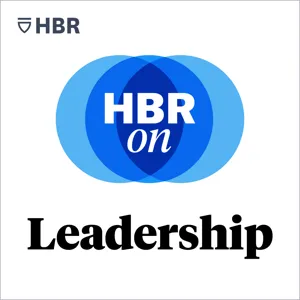Podcast Summary
Effective Self-Disclosure for Building Trust and Improving Team Performance: Leaders who genuinely share authentic and relevant personal information in the work context can build trust, improve communication, and foster stronger teams.
Effective self-disclosure is a valuable tool for building trust and improving team performance. According to Lisa Roche, an assistant professor of management at Yeshiva University, genuine self-disclosure involves sharing personal information that is authentic and relevant to the work context. The timing, substance, and process of self-disclosure are also important considerations. Leaders should avoid using self-disclosures to promote themselves or seek approval from others. Instead, they should focus on building stronger communication and fostering a culture of trust within their teams. Roche's research suggests that leaders who get self-disclosures right can make a positive impact on their teams and help them perform at their best. If you're a new manager or looking to build trust with your team, this episode is a valuable resource. While the audio quality may not be great, the insights from Lisa Roche are worth listening to.
Effective self-disclosure in the workplace: Sharing personal experiences wisely and authentically can enhance performance and build trust, but exaggerating or fabricating stories can harm trust. Self-disclosure should fit the task, help advance goals, and demonstrate self-awareness and strong communication skills.
Authentic self-disclosure can significantly enhance performance and build trust in the workplace, but it's essential to do it wisely and effectively. Exaggerating or fabricating stories can harm trust and lead to negative consequences. Self-disclosure should fit the task at hand, including the timing, substance, and process. It should help advance the goal, not be used for self-promotion or fulfilling personal needs for approval. A powerful example of effective self-disclosure comes from a hospital chief nursing officer who, during a reorganization, shared her personal experience of being downsized earlier in her career and related it to the current situation. This helped diffuse tension and resulted in the first department coming up with a plan to save jobs. However, it's also important to avoid self-disclosure that doesn't serve the purpose, such as revealing too much about personal life or not knowing oneself well. Effective self-disclosure requires self-awareness and strong communication skills.
Balancing self-disclosure in the workplace: Executives should find the right balance of self-disclosure to build trust and strong relationships, considering context and cultural norms. Sharing too much or too little can hinder professional growth.
Effective self-disclosure in the workplace is crucial for building trust and strong relationships, but it's essential to be mindful of the context and cultural norms. Some executives disclose too much, appearing phony or lacking discipline, while others share too little, appearing remote or inaccessible. Finding the right balance is key. For instance, a chatty executive who shared confidential information with his team may have meant well, but if it hindered his professional growth, he needed to learn when self-disclosure was helpful and when it was just for personal gratification. Conversely, an executive who kept to himself might struggle to create meaningful relationships. Understanding cultural nuances and being aware of the impact of self-disclosure in different contexts can help executives navigate these challenges and build trust with their teams.
Cultural norms and time duration impact info sharing: In individualistic cultures, people openly share info to build trust, while collectivist cultures keep personal info private to protect honor and reputation. Clear goals and tasks can foster cohesion without forced info sharing.
Cultural norms and time duration play crucial roles in determining when and how much information should be disclosed in different contexts. In individualistic societies like America, people are more open to sharing information and admitting mistakes to build trust and rapport. However, in collectivist cultures such as China and Japan, disclosing personal information is less common and may even be seen as risking one's honor and reputation. Furthermore, it's important to note that intimate interactions and information sharing should not be forced, especially during the initial stages of a relationship or team building activities. Instead, setting clear goals and roles and working on tasks together can naturally foster cohesion and relationship building.
Building virtual trust through professional social media: Use LinkedIn for professional connections, maintain a professional tone on Twitter, and balance professionalism and authenticity in online interactions to build trust within a team.
While physical trust-building activities like visioning exercises and goal-setting can be effective in forming bonds and trust within a team, relying solely on extreme physical activities like trust falls can do more harm than good. Instead, focus on building virtual trust through professional social media use. Keep personal social media accounts private and assume they're public, and use LinkedIn to connect with professional groups. On Twitter, maintain a professional tone and make tweets related to business and knowledge base. However, be careful not to come off as too polished or scripted, as authentic self-disclosure can also help build trust. Ultimately, the key is to find a balance between professionalism and authenticity in both physical and virtual team-building activities.
Effective self-disclosure in a professional setting: Genuine apologies and positive emotions can build trust and improve team performance, but be aware of cultural norms and specific situations. Self-disclosure should serve the task at hand rather than personal needs.
Self-disclosure in a professional setting can be an effective tool to build trust and improve team performance, but it's crucial to be aware of cultural norms and the specific situation. Research shows that genuine apologies and positive emotions can increase trust and organizational commitment in US culture. However, negative emotions, especially for women expressing anger, can be perceived negatively. Therefore, it's essential to know oneself and the environment and ensure that self-disclosure serves the task at hand rather than personal needs. Be yourself, but be mindful and thoughtful in your self-disclosure.
Stay informed and engaged with the latest ideas from top business and management experts: Continuous learning and sharing knowledge is crucial for leadership growth. Listen to podcasts, read articles, watch videos, and engage with thought leaders to expand your knowledge and improve your leadership skills.
The importance of continuous learning and sharing knowledge in leadership. Whether it's through podcasts, articles, case studies, books, or videos, staying informed and engaged with the latest ideas from top business and management experts can help us grow as leaders. So, if you found this conversation insightful, consider sharing it with your network and subscribing to our show for more thought-provoking discussions. And, don't forget to leave us a review to help spread the word. At Harvard Business Review, we're committed to providing you with high-quality content to support your personal and professional development. Tune in next week for another inspiring conversation.





